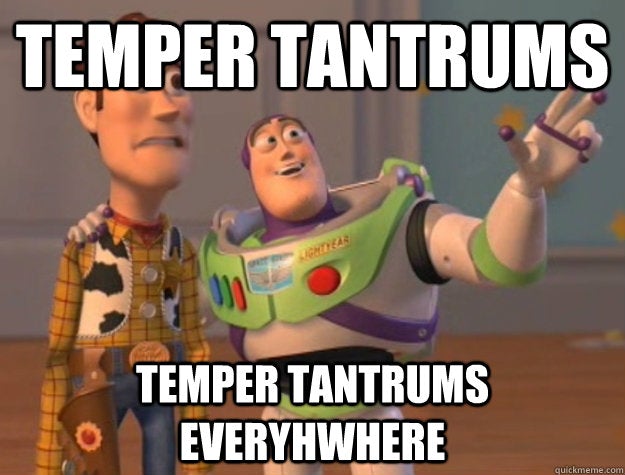Managing Toddler Tantrums

“When I see a kid having a meltdown I try to give the mum a sympathetic look, but on the inside I'm so damn happy it's not my turn”
We’ve all carried our kid out of the supermarket surfboard style, screaming their heads off and feeling the stare's, it’s a nightmare for everyone involved…
Raising a toddler requires a whole new set of parenting skills. It’s essential to be patient and consistent. There’s so much a parent needs to teach and learn.
1) Throwing a screaming tantrum
A screaming and unreasonable toddler can leave even the most chilled out parent feeling helpless and embarrassed. But it’s important to remember that tantrums are one of your kids’ ways of expressing themself, whether they’re tired, angry, or frustrated. And as long as these emotions don’t hurt someone, parents should allow their tot to have them
Try this: Parents should respond but not react. Ignore their behaviour and don’t try and reason with them, as they won’t understand. You simply have to wait until the tantrum burns itself out.
2) “No! No! No!”
This two-letter word can turn even the simplest of tasks into a battle of wills that’s bound to frustrate even the most patient parent. Children engage in power play as toddlers. They’re trying to figure out who’s in control – you or them.
Try this: There’s a difference between telling your child and asking them. Instead of asking your little one ‘Do you want to put your shoes on, and we’ll go to the park?’, rephrase it so you’re gently telling them by saying ‘Put your shoes on because we’re going to the park’. Keep your tone of voice conversational.
3) “That’s mine!”
You might cringe as your little one snatches a toy out of another kid’s hand, but rest assured that learning to share will develop over time. “There’s an expectation that your toddler will just do as you say the first time and everything will be OK, so that’s why repetition is one of the essential tools that are necessary in the toddler years.
Try this: A trip to the library is a good way to teach your child that the books and toys are for everybody to use. Playdates are important for helping your little one to understand that other children will come to their house and play with their toys, so they need to share them.
8 crucial guidelines for dealing with meltdowns
- Communicate clearly
- Adopt a positive mindset
- Repeat again and again
- Be consistent
- Give encouragement
- Establish routines
- Have realistic expectations
- Set boundaries
And don’t forget: Eye contact with your child at their level is extremely important, as it’s the first basis of your communication with them, especially when trying to put across a resolution to a problem you’re having.
Remember you’re not the only one and you’re not alone x
